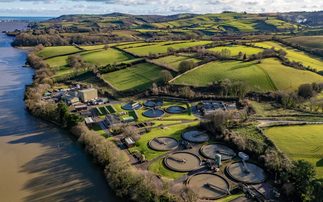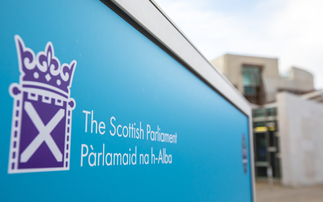New text suggests negotiations are edging forward, but funding issues continue to overshadow climate talks in Paris as G77 warn over language in draft text
The UN and the French hosts of the Paris Climate Summit have this morning released a new draft negotiating text, which suggests that while the talks are making slow progress many of the key issues remain unresolved.
The text, entitled Draft agreement and draft decision on workstreams 1 and 2 of the Ad Hoc Working Group on the Durban Platform for Enhanced Action, has been fractionally slimmed down to 50 pages, including 26 pages in the core legally binding part of the agreement, down from 31 pages.
It is the first of a number of draft texts expected to be unveiled this week, with another version expected tomorrow and potentially a third on Saturday.
The draft text retains all of the key components of the planned agreement, including the proposed system of national climate action plans, known as INDCs, mechanisms for mobilising climate finance, an overarching long term emissions target, and a new regime for periodically assessing national progress in curbing emissions.
However, as is customary at COP negotiations the text remains littered with square brackets and different options, denoting where agreement is yet to be secured.
Tasneed Essop, WWF's head of delegation at the talks, said the changes so far were a "mixed bag" and she accused negotiators of "rearranging the deck chairs on the ship to get a better view of the iceberg".
"It is clear that progress has been too slow," she said in a statement. "In some areas, the options are now clearer and better structured, but generally we still have very divergent options in this version of the text. It is good to see that despite some fears the text has not ballooned further with lots of new insertions though."
For example, the text retains calls from climate vulnerable states for the temperature goal agreed in the final agreement to be lowered from 2C to 1.5C. The opening line of the text refers to "the goal of holding the increase in the global average temperature [below 2C][below [2 or] 1.5C]".
Similarly, the section on a "collective long term goal", includes at least five options. They range from time-specific goals to achieve "zero global GHG emissions by 2060-2080" to vaguer commitments to deliver on the 2C or 1.5C temperature goal through "a long-term low emissions transformation] [toward [climate neutrality][decarbonization] [over the course of this
century] [as soon as possible after mid-century]" or "[equitable distribution of a global carbon budget based on historical responsibilities and [climate] justice".
The text also confirms that two of the key dividing lines at the talks centre on the issues of how to review progress countries make against their national climate action plans and how climate funding should be mobilised.
The draft text includes commitments for countries to update and review their INDCs every five years, as well as a line that suggests INDCs should only be weakened in extreme circumstances. However, a raft of square brackets indicates that considerable disagreement remains over how such a review system should work.
Moreover, proposals from a number of industrialised nations for the wording on climate funding to include a commitment that "all Parties in a position to do so" should providing funding support to developing nations are included in square brackets, despite fierce opposition from China and India.
Both emerging economy superpowers have provided climate funding to poorer nations through so-called 'south-south' funding, most notably in the form of a recent $3bn pledge from China.
However, last night China and India have accused rich nations of trying to dodge their commitments to help poor countries pay the costs of coping with climate change, warning this could cause talks in Paris this week to fail.
In a strongly worded statement, China and the G77 group of developing nations, said they were "deeply concerned" by attempts "to introduce economic conditions" in the finance section of the text.
At the centre of the row is the line, backed by the EU and USA, that aims to recognise the growing 'south-south' flows of climate finance by extending funding pledges to those nations that are "in a position to do so".
The proposal appears to allow countries to determine themselves if they are in a position to provide funding and would mean the text recognises that some nations once classified as poor under the UN process now have per capita incomes as high as industrialised nations that are required to mobilise climate funding.
But yesterday, the G77 accused rich countries of using the line to try to circumvent their "core obligation" to provide financial support to developing countries. "Any attempt to replace the core obligation of developed countries to provide financial support to developing countries with a number of arbitrarily identified economic conditions is a violation of the rules-based multilateral process and threatens an outcome here in Paris," the statement said.
They also accused rich countries to trying to create a "simplistic narrative" around climate finance and argue that the pool of donors should grow because of the "dramatic economic development gains" of some countries.
"This narrative serves narrow national interests of developed countries and says little about reality," the statement said.
The issue of finance is a major sticking point in efforts to strike a climate deal, with many poorer countries arguing they will be unable to commit to ambitious emissions reduction measures unless richer countries pledge fresh funds to help them deploy clean technologies and cope with escalating climate impacts.
Yesterday, India accused the respected think tank, the OECD, of exaggerating the total donated so far. According to the Guardian, the Indian ministry said the OECD analysis that $57bn had been raised so far was "questionable". Indian officials argued just $2.2bn of additional funding had been raised to date.
However, in more encouraging signs the country has also reportedly pledged to cut its investments in coal power if the deal next week delivers more money to help it shift to cleaner sources of energy such as solar power. "We've made it very clear that solar and wind is our first commitment," said Ajay Mathur, director general of India's Bureau of Energy Efficiency, told the Financial Times.
Yesterday Christiana Figueres, head of the UN's Framework Convention on Climate Change (UNFCCC), told reporters to expect a "rainfall" of financial commitments from governments over the next few days because they are increasingly seeing that it is in their own interest to mobilise climate finance.
US Special Envoy Todd Stern said he was confident the $100bn climate funding goal would be delivered. "We are at a pretty high number, both where we are now and where we are projected to be in the next few years," he said, adding that a major concern was to reassure countries that they are on track.
Attention will now turn to the French hosts who have delivered the latest text a day earlier than expected and will now have to steer the negotiations to try and resolve as many of the outstanding issues as possible before ministers arrive next week for the high level phase of the talks.
This article is part of BusinessGreen's Road to Paris hub, hosted in association with PwC.








